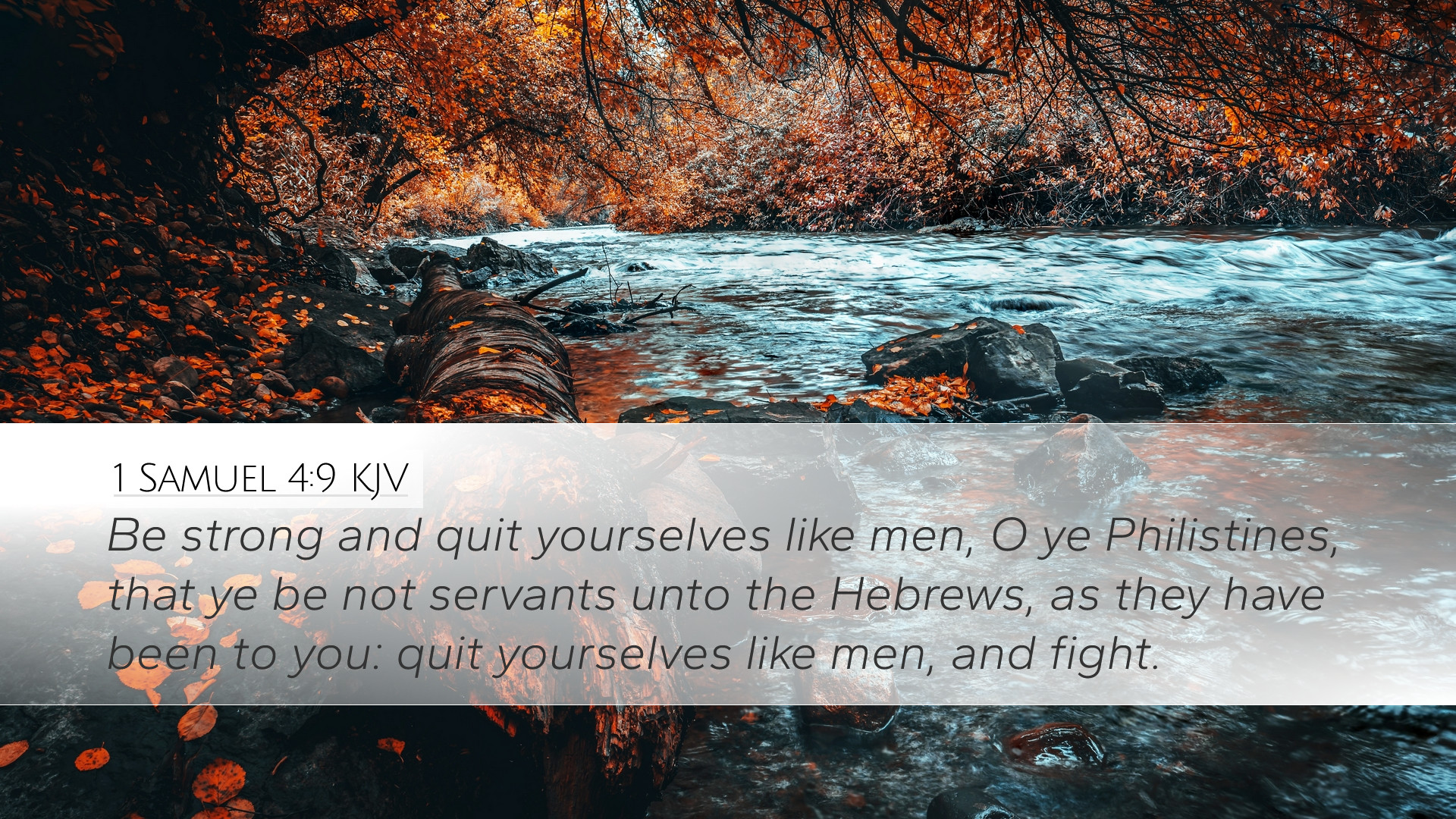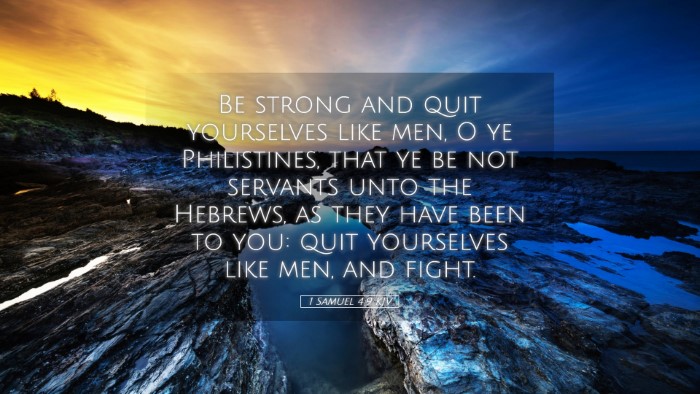Commentary on 1 Samuel 4:9
1 Samuel 4:9 states: "Take courage, and be men, O Philistines, lest you become servants to the Hebrews, as they have been to you; be men and fight." This verse comes at a critical juncture in the narrative, highlighting the tension between the Philistines and the Israelites during the days of Eli the priest. The Philistine leaders call upon their men to muster courage in the face of the Israelite threat, which sets the stage for an exploration of themes of fear, identity, and divine sovereignty.
Contextual Background
This passage occurs after the Israelites had suffered defeat at the hands of the Philistines, resulting in the capture of the Ark of the Covenant. The Ark, a symbol of God's presence among His people, represented divine power; thus, its loss indicated a severe spiritual crisis for Israel. The Philistines, emboldened by their victory, urged one another to stand strong against the possibility of servitude to the Hebrews, emphasizing their fear of becoming what they had once imposed on Israel.
The Call to Courage
- Courage in Battle: The call to "take courage" reflects the need for valor in the face of overwhelming odds. Albert Barnes notes that courage in battle is not merely physical but involves spiritual fortitude, rooted in one's identity and convictions.
- The Nature of Manhood: The phrase "be men and fight" speaks to an ethic of manhood rooted in responsibility and strength. Matthew Henry interprets this exhortation as a reminder that true strength is not merely about physical prowess, but rather about fulfilling one's duty towards family, faith, and country.
- Existential Threat: This passage reflects the existential struggle of nations, where fear of conquest breeds a desperate resolve to stand against enemies. Adam Clarke comments on the ominous significance of the Philistines' rallying cry, implying that they were aware of the high stakes of this conflict.
Theological Implications
The usage of the Ark by the Israelites earlier in their conflict with the Philistines indicates an underlying misunderstanding of the nature of God and His presence. The Philistines’ awareness of the Ark’s significance underlines a crucial theological point: God cannot be manipulated or weaponized. As they urged their men to fight, they were likely oblivious to the fact that divine favor rests not on human machinations, but on true repentance and faith.
Divine Sovereignty
Commentators note that the unfolding events are culminating in a lesson about God's sovereignty. While the Philistines appear to succeed, their victory is only temporary. Matthew Henry observes that the true battle belongs to the Lord, signifying that while human beings make choices in the face of conflict, it is ultimately God who governs the outcomes.
Fear and Governance
The Philistine leaders’ counsel resonates with deeper emotional and psychological dimensions. It recognizes how fear can govern man’s actions. Clarke points out that fear—be it of subjugation or of defeat—can drive men to act with either extreme courage or profound cowardice. The interplay of fear and leadership in this verse serves as a timeless reminder for modern congregations about the nature of spiritual battles they face daily.
Lessons for Today
- The Nature of Leadership: The exhortation to “be men” speaks volumes about the spiritual and moral leadership in today’s society. Pastors and leaders are called not only to evoke courage but to embody it, standing against cultural and spiritual apathy.
- The Importance of Spiritual Preparedness: The initial failure of the Israelites to seek God’s guidance before the battle serves as a cautionary tale, urging believers to prepare spiritually before facing any significant challenge, echoing principles laid out in Ephesians 6 regarding the armor of God.
- Understanding Our Identity: The question of identity ('Are we as men or servants?') invites reflection on our identity in Christ. Believers are called to stand firm and fight not against flesh and blood but against spiritual forces, rooted in the assurance of God’s presence and protection.
Conclusion
In summary, 1 Samuel 4:9 serves as a powerful reminder of the spiritual dynamics at play in the narrative of Israel versus Philistine. Through the exhortation to courage and manhood, it unveils the depth of human emotions and the complex interplay of fear, identity, and the overarching sovereignty of God. It encourages pastors, students, and scholars alike to lead with strength, seek divine guidance, and understand their identities in light of God's redemptive purpose. This passage, framed within its historical and theological context challenges us to reflect on our responses in times of spiritual battle, recognizing that true victory rests with the Lord.


